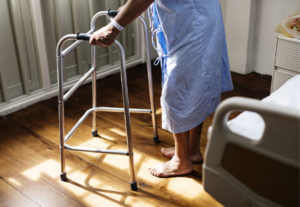 The number of Americans over the age of 75 who die following a fall is increasing. The National Center for Health Statistics reports that in 2000, 52 out of 100,000 people 75 years and older died after a fall. In 2016, that number rose to 111 people per 100,000.
The number of Americans over the age of 75 who die following a fall is increasing. The National Center for Health Statistics reports that in 2000, 52 out of 100,000 people 75 years and older died after a fall. In 2016, that number rose to 111 people per 100,000.
Here are some other sobering statistics from the U.S. Centers for Disease Control and Prevention regarding falls and the elderly:
- One out of four Americans over the age of 65 fall every year.
- Every 11 seconds an older adult is treated in the emergency room for a fall.
- Every 19 seconds, an older adult dies from a fall.
- Falls are the leading cause of fatal injury and the most common cause of nonfatal trauma-related hospital admissions among the elderly.
- Falls result in more than 2.8 million injuries treated in emergency departments each year, this includes more than 800,000 hospitalizations and more than 27,000 deaths.
Geriatricians note that there are several reasons falls are on the rise. Perhaps the most significant factor is that people are living longer. Medications that allow individuals to live with chronic conditions often increase the risk of falls.
Older adults who are not injured after falling still face significant consequences, including a fear of falling, which causes them to limit their activities and social life. The result is depression, physical decline and social isolation.
Thankfully, most falls are preventable. What follows are some ways seniors can avoid falling:
Exercise: Incorporating exercise into a senior’s daily routine will go a long way toward preventing falls and lessening the chance of injury and death from falls. Doctors recommend 20 minutes a day of a combination of aerobic and anaerobic exercise. Improving balance also is important.
Focus: When walking outdoors, avoid bifocals or progressive lenses as they impact depth perception when stepping off a curb, for example. Single-focus lenses should be worn when walking outdoors.
Drink water and take frequent bathroom breaks: Drinking enough water will help to stave off dizziness but it is important that seniors go to the bathroom frequently. And seniors should not wait until the last minute to go to the bathroom since rushing often leads to trips and falls.
Trip-proof your home: Get rid of area rugs and any clutter on the floor – including any cords. Keep a light on at night for trips to the bathroom.
If you have questions about living arrangements for your elderly parent, including in-home care services, call Physician’s Choice Private Duty today at 402-331-2273.
Omaha
8212 F Street
Omaha, NE 68127
402-827-7818
fax 402-933-4255
FIND US ON FACEBOOK
Physicians Choice Private Duty
Omaha's Premier In Home Assisted Living Provider


